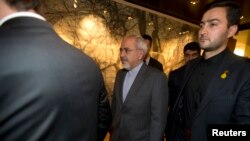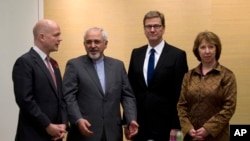Nuclear talks between Iran and major world powers ended Saturday in Geneva with no deal, but Iran says it is not disappointed.
Foreign Minister Mohammad Javad Zarif told reporters that the three days of talks were good and gave all side something to build on. He says he hopes there can be a deal when the talks resume November 20.
European Union foreign affairs chief Catherine Ashton said there was concrete progress but that differences remain. She gave no details.
French Foreign Minister Laurent Fabius told reporters that Paris is not satisfied with Iran's position and will not be part of what he called a "fool's deal."
Fabius told French radio that Iran must suspend work on its plutonium-producing reactor in the western city of Arak. He also called for a reduction in the purity of Iran's stockpile of highly enriched uranium.
The talks in Geneva between Iran and the five permanent members of the U.N. Security Council plus Germany are aimed at persuading Iran to suspend work that could give it the capacity to develop nuclear weapons. In exchange, the U.N would ease some of its crippling sanctions against Iran.
U.S. Secretary of State John Kerry told a press conference that there is no question that all sides are closer to a deal now than when the talks began. He said diplomacy must be exhausted but warned that such a window will not stay open indefinitely.
The United States and its allies accuse Iran of seeking to build a nuclear bomb. Iran insists its nuclear program is strictly for peaceful civilian use.
'Exceptional opportunity'
Iranian President Hassan Rouhani had urged the six major powers not to miss what he called an "exceptional opportunity" to reach a deal in Geneva to resolve the decade-long Iranian nuclear dispute.
Iran's state-run news agency IRNA said Rouhani made the comment in a meeting in Tehran Saturday with visiting Japanese Foreign Minister Fumio Kishida.
Iranian media quoted Foreign Minister Mohammad Javad Zarif as saying there were divisions among the six major powers. Zarif, leader of the Iranian delegation in Geneva, had said if the current rounds does not produce an agreement, a new round of negotiations would be held in seven to 10 days.
Reporters in Geneva say U.S. Secretary of State John Kerry and the European Union's foreign-policy chief, Catherine Ashton, are expected to issue statements late Saturday.
Iran has long resisted U.N. Security Council demands to suspend enrichment. However, the new Iranian government that took office in July has suggested compromise is possible on the pace of its nuclear work.
In return, Iran wants an easing of international sanctions that have hobbled its economy.
Diplomats react
Earlier Saturday, British Foreign Secretary William Hague said the negotiations have made "very good progress," but that there are still important issues to resolve before a deal is reached.
"If there is not (a deal), of course then we must continue to apply ourselves in the coming weeks, building on the progress that has been made already," said Hague. "But we are making every effort to do so. While a number of issues have been satisfactorily addressed, the atmosphere of these negotiations, as others have told you before, is completely different from the atmosphere of a few months ago.''
Kerry said Friday there were "some important gaps" remaining between Iran and the Western powers, but that the parties were "working hard."
Russian Foreign Minister Sergei Lavrov joined the negotiations on Saturday, and China has sent its deputy foreign minister, Baodong Li, to Geneva.
On Friday, U.S. President Barack Obama telephoned Israeli Prime Minister Benjamin Netanyahu, who is deeply skeptical about the negotiations. The White House said Obama stressed he is fully committed to preventing Iran from getting nuclear weapons.
Earlier Friday, Netanyahu reacted sharply to indications that Western powers were moving closer to an agreement with Iran. He told reporterrs Iran "got everything and paid nothing" in the negotiations because it is not reducing its enrichment capability.
"Iran got the deal of the century and the international community got a bad deal," Netanyahu said. "This is a very bad deal, and Israel utterly rejects it."
Foreign Minister Mohammad Javad Zarif told reporters that the three days of talks were good and gave all side something to build on. He says he hopes there can be a deal when the talks resume November 20.
European Union foreign affairs chief Catherine Ashton said there was concrete progress but that differences remain. She gave no details.
French Foreign Minister Laurent Fabius told reporters that Paris is not satisfied with Iran's position and will not be part of what he called a "fool's deal."
Fabius told French radio that Iran must suspend work on its plutonium-producing reactor in the western city of Arak. He also called for a reduction in the purity of Iran's stockpile of highly enriched uranium.
The talks in Geneva between Iran and the five permanent members of the U.N. Security Council plus Germany are aimed at persuading Iran to suspend work that could give it the capacity to develop nuclear weapons. In exchange, the U.N would ease some of its crippling sanctions against Iran.
U.S. Secretary of State John Kerry told a press conference that there is no question that all sides are closer to a deal now than when the talks began. He said diplomacy must be exhausted but warned that such a window will not stay open indefinitely.
The United States and its allies accuse Iran of seeking to build a nuclear bomb. Iran insists its nuclear program is strictly for peaceful civilian use.
'Exceptional opportunity'
Iranian President Hassan Rouhani had urged the six major powers not to miss what he called an "exceptional opportunity" to reach a deal in Geneva to resolve the decade-long Iranian nuclear dispute.
Iran's state-run news agency IRNA said Rouhani made the comment in a meeting in Tehran Saturday with visiting Japanese Foreign Minister Fumio Kishida.
Iranian media quoted Foreign Minister Mohammad Javad Zarif as saying there were divisions among the six major powers. Zarif, leader of the Iranian delegation in Geneva, had said if the current rounds does not produce an agreement, a new round of negotiations would be held in seven to 10 days.
Reporters in Geneva say U.S. Secretary of State John Kerry and the European Union's foreign-policy chief, Catherine Ashton, are expected to issue statements late Saturday.
Iran has long resisted U.N. Security Council demands to suspend enrichment. However, the new Iranian government that took office in July has suggested compromise is possible on the pace of its nuclear work.
In return, Iran wants an easing of international sanctions that have hobbled its economy.
Diplomats react
Earlier Saturday, British Foreign Secretary William Hague said the negotiations have made "very good progress," but that there are still important issues to resolve before a deal is reached.
"If there is not (a deal), of course then we must continue to apply ourselves in the coming weeks, building on the progress that has been made already," said Hague. "But we are making every effort to do so. While a number of issues have been satisfactorily addressed, the atmosphere of these negotiations, as others have told you before, is completely different from the atmosphere of a few months ago.''
Kerry said Friday there were "some important gaps" remaining between Iran and the Western powers, but that the parties were "working hard."
Russian Foreign Minister Sergei Lavrov joined the negotiations on Saturday, and China has sent its deputy foreign minister, Baodong Li, to Geneva.
On Friday, U.S. President Barack Obama telephoned Israeli Prime Minister Benjamin Netanyahu, who is deeply skeptical about the negotiations. The White House said Obama stressed he is fully committed to preventing Iran from getting nuclear weapons.
Earlier Friday, Netanyahu reacted sharply to indications that Western powers were moving closer to an agreement with Iran. He told reporterrs Iran "got everything and paid nothing" in the negotiations because it is not reducing its enrichment capability.
"Iran got the deal of the century and the international community got a bad deal," Netanyahu said. "This is a very bad deal, and Israel utterly rejects it."






